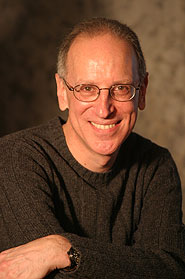Berkeleyan
Should you give Richard III your seat on the bus?
Randy Cohen, aka 'The Ethicist,' talks about tattletales, etiquette, and treachery
![]()
| 17 November 2005
 Randy Cohen will share his ethical insights with a Zellerbach Hall audience this Saturday. |
Cohen will give a talk called "How to Be Good" on Saturday, Nov. 19, at 8 p.m. in Zellerbach Hall, and then field questions from the audience related to their own ethical dilemmas. The Berkeleyan spoke with him recently about his job as an arbiter of ethically correct behavior.
You've been writing "The Ethicist" for seven years. What in your background prepared you for the job?
I'm harsh, judgmental, cruel, and coldhearted when I view human contact.
I've read some of your past columns. My impression is that you take a pretty measured approach.
We're talking about ethics, not sin. I'm commenting on people's behavior - not their souls. Also, the people who tend to write to me are already living in a moral universe. The ones who don't write in are the people I want to be harsh with. For example, the head of Wal-Mart doesn't ask me about whether it's ethical to discontinue health insurance for their workers.
Into what types of categories do the questions you receive fall ?
The "Do you tell?" questions are the most common, when people are aware of and troubled by the wrongdoing of others. For example, your best friend's spouse is having an affair, or a friend has downloaded and is plagiarizing a paper. Initially, I found this sort of question very discouraging - I thought people were just too lazy to do something wrong themselves.
The "Do you tell?" question is fraught with conflict. We value tolerance and have very mixed feelings about coming forth with information about other people. Even the language that describes people who tell is pejorative: squealer, tattletale. Yet coming forward is how society encourages good behavior.
How do you think your column has evolved since you started writing it?
The mail I receive has brought about changes in my thinking and has often led me to reverse myself. There's also a bigger way in which my thinking has changed. Initially, I viewed ethics more narrowly - for instance, as the way an individual responds to a moment of crisis.
Do you mean his or her character?
That's right. Now, though, my impression is that people's values are shaped by their circumstances - first by the time and place in which they live, second by their families, and thirdly by whatever religion they have been exposed to. People tend to behave like their neighbors. That seems to shape what people will do. Very few of us are Richard III-type villains and very few of us are saints. It becomes important to develop honorable communities - both our physical neighborhoods and the culture of our workplaces and our families.
Which letters do you gravitate toward answering?
My options have narrowed since I've been writing the column, because I don't want to run letters that are too similar to those I've answered before. I try to keep addressing new questions. There's a human ingenuity when it comes to treacherous conduct; we renew ourselves constantly.
How do you arrive at your answers?
I think them over - that's the process. Also, I use conversation as an analytical tool, turning to people who are quite sophisticated and who have spent a lot of time thinking about these issues. I have a roster of people who know about such topics as the AMA code of conduct or issues surrounding free expression.
When people find out what you do for a living, do they start peppering you with ethics questions?
They do. I've learned to handle it in the same way a doctor friend does. I say, "Take off your clothes, hop on the table, and I'll sort it out."
I tried to think of ethical questions for this interview, but I mostly came up with etiquette questions. Is there an overlap between good etiquette and ethical behavior?
Some etiquette questions are legitimate ethical questions: You're on the bus and someone frail needs a seat. Should you offer it? Ethics involves the effects of your actions on others. You have a duty to render aid, and that includes giving someone who's weary and infirm your seat. On the other hand, questions involving which fork to use during a given course aren't ethical, since the decision poses no potential harm to another person.
How does society's view of what is ethically acceptable change?
I believe it changes through discourse more than anything else. There was a time in our country when most Americans thought slavery was just fine.
Physical setting can also change conduct. There was a spot in New York City where there was always a rough-and-tumble scramble for taxis. Then the city painted a yellow line in that location, and now everyone queues up. Passing laws sometimes creates a set of social assumptions.
Do you think ethical behavior can be learned?
I think it can be changed - that's the point of it. Look at Abu Ghraib. Why did people behave so appallingly there? You can create conditions where ethical behavior or a lack of it is more likely. As I said before, ethical behavior has very little to do with character and very much to do with circumstances. Creating an honorable community, then, becomes a moral duty.
Tickets for "How to Be Good," priced at $20, $26, and $32, are available through the Cal Performances Ticket Office at Zellerbach Hall; at 642-9988 to charge by phone; at www.calperfs.berkeley.edu; and at the door.

